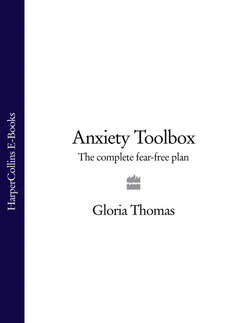Читать книгу Anxiety Toolbox: The Complete Fear-Free Plan - Gloria Thomas - Страница 28
Panic Disorder
ОглавлениеSome people experience anxiety through the feeling of panic. Panic disorders affect 0.7 per cent of the British population and 2.4 million Americans, and are twice as common in women than men.
The attacks of anxiety that are usually experienced with panic disorder can be very scary and can last from 5 minutes to 30. An individual can feel fine one minute and the next find themselves in the grip of extreme fear and anxiety for no apparent reason. An attack is usually preceded by a feeling of something being not quite right. This then quickly escalates into sheer panic, absolute terror and a feeling of being out of control. The catastrophic thoughts that follow the initial sense of foreboding cause a powerful physiological response, which then reinforces the thoughts. It is this feedback loop between thought and sensation that exacerbates the condition, causing anxiety to spiral out of control. At the height of an acute panic attack the sufferer feels completely powerless and really believes that this time the worst is going to happen – i.e. that they are about to die or go crazy. (Thankfully, this never happens.) Some people may only experience one or two panic attacks in a lifetime but others are plagued with panic attacks on a weekly or monthly basis.
Panic attacks can, of course, be mild and therefore will not have a huge impact on a person’s life. However, when they are acute and debilitating they can restrict the sufferer’s life in many areas. This is due not only to the fear of causing an attack but because of the uncertainty as to when and where the next one is going to occur. Hence sufferers avoid certain situations, places and people that could bring on an attack or where they would feel vulnerable or embarrassed should one happen.
Unfortunately, fear of an attack can often bring on the condition itself. Fear makes us more alert and hypersensitive and we can then begin to look out for any bodily sensations that indicate a panic attack is going to occur or any situations that could bring one on – for example, being in a lift or a crowded room or in an aeroplane, anything that is a reminder of the original attack. Panic attacks can also occur during sleep. The sufferer will waken up gripped with fear, and panic that they are going to have a heart attack.
Like most other anxiety disorders, if you suffer from panic disorder you are also likely to suffer from anxiety in other areas. Depression is closely linked to panic disorder, as is agoraphobia, claustrophobia and social phobia.
